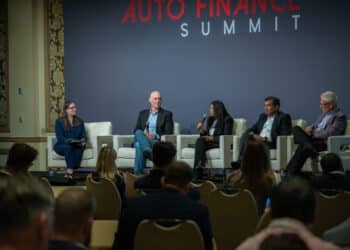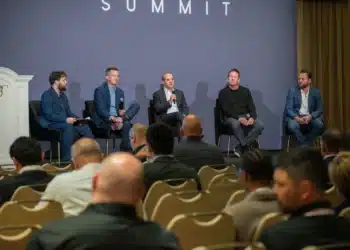My thanks to my colleague Alex Kwanten, who contributed significantly to this post.
When the most valuable company in world — that would be Apple for all of you living in a bomb shelter since the 1960s — sets its sights on making cars, there is not a person in the automotive industry that shouldn’t take notice.
But what about auto finance? What are the implications of Apple’s “Titan” skunkworks project, as well as Google’s automotive initiative?
Firstly, let’s deal with a more straightforward question: Why are Apple and Google getting into the car business? They clearly see an opportunity — but what is it exactly?
Firstly, driverless electric cars. They want in on the software side of it at least and, if they can, to produce their own vehicles. Google already debuted a prototype, although it’s pretty early stages mechanically. Apple already provides some software to Tesla, although Apple is not purported to be building a driveless car now.
Both Apple and Google seem to see what is a long-term trend: the devolution of the car from 20th Century norms — “cars are an …object of status / source of freedom / source of easy travel” to a more 21st Century view — “cars are just another appliance and we’re trapped in traffic all the time.” And they see or believe that plenty of people would just as well ride in a car with a computer doing the driving as drive one. Given the advantage they have in software know-how over traditional automakers — or so they think — they see it as a ground-floor opportunity they can get in before a potentially major consumer move.
Whether that move will actually happen — the first few times there are fatal accidents in self-drivers, there’s going to be major public reaction, and some people may never really be comfortable with it — and whether or not these companies can build something compelling (the Google prototype car looks like a cross between a Smart car and a Pokemon) or master the challenge of producing actual vehicles … remains to be seen.
Secondly, there seems to be a bit of seeing a technologically oriented company like Tesla (its market capitalization is now equal to 25 times its fourth-quarter total revenue) making inroads and realizing one of the largest industries in America is ripe for innovation. They see Tesla and think, “If Tesla can do that, so can we.” It’s right in their backyard, it employs the same type of employees, and it’s of the same culture. They see Uber and Lyft, too.
What Google appears to be pursuing is to produce these little car-pods and have them essentially replace taxis and the cars of people who hate to drive but need to get around locally. Then, you would have a system where people are continually paying for use and where they are a captive audience for Google advertising or related services. There’s behavioral data in it, too. It would, of course, be most beneficial to people without good mass transit options and long commutes. People are already doing this with services like Car2Go, but with conventional cars — this would be two steps further than that. No need for a driver, no need for conventional fueling systems or the people and infrastructure that go along with that, plus all the benefits of it coming to you rather than you going to it (like Uber).
RIPE FOR INNOVATION
This approach also eschews the need to make the cars “desirable vehicles” in the conventional sense (Tesla’s cars might be technological marvels, but they sell because they have all the merits of a really good conventional car — style, speed, status, sophistication), which is one reason why the Google prototype is so totally devoid of anything resembling a conventional car other than four wheels, doors, and seats. Apple’s Titan project is apparently building something that looks like a minivan. We’re not sure what to make of that.
Apple and Google don’t just want to innovate cars, they want to reinvent how we think about cars entirely. Perhaps they’d even prefer to call them something other than “cars.”
Which brings us to financing. Clearly, if driverless cars catch on, the financing for those cars might change as well. If the cars are more “public,” meaning that people use whichever driverless car happens to be around when they need them — like Uber — then perhaps lenders might end up financing them more frequently in fleet transactions, rather than through the indirect channel. Does a world of driverless cars reduce the net number of cars on the road? Perhaps, and more likely in urban areas.
As for Apple, in the six or so months since it has launched Apple Pay, the technology giant has shown a remarkable ability to “get” the financing game. Apple Pay has solved what many contactless payments ventures have tried before (including Google) and failed. It has found users at scale among both consumers and merchants, and that has cinched its adoption. If you aren’t using Apple Pay yet, you will. Which is why it stands to reason that Apple will have no need to give away the financing portion of its Apple Titan sales. And if Apple sells cars like it sells iPhones … well, you get the picture.
The thing is that “picture” will not be developed for a long time — certainly several years, if not longer. Think of it as something to, er, look forward to.






